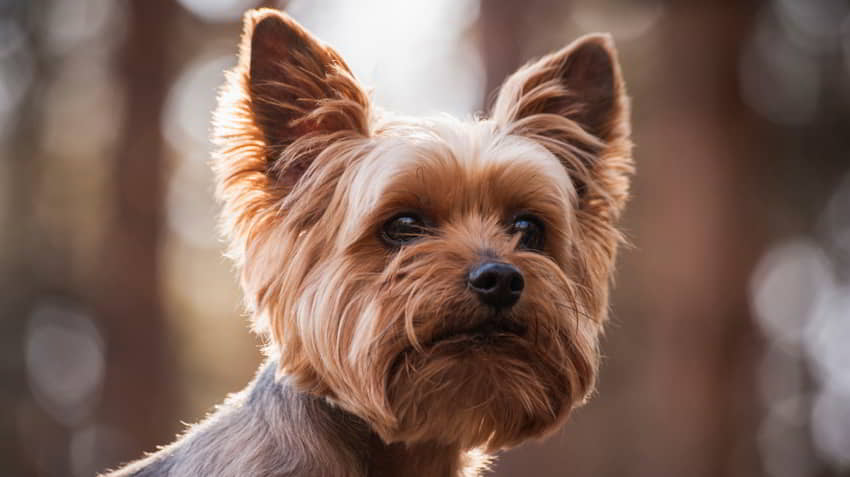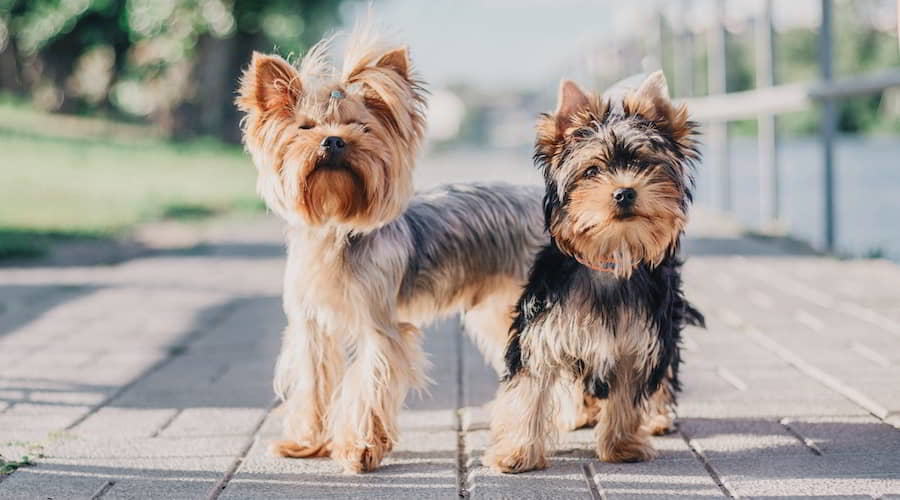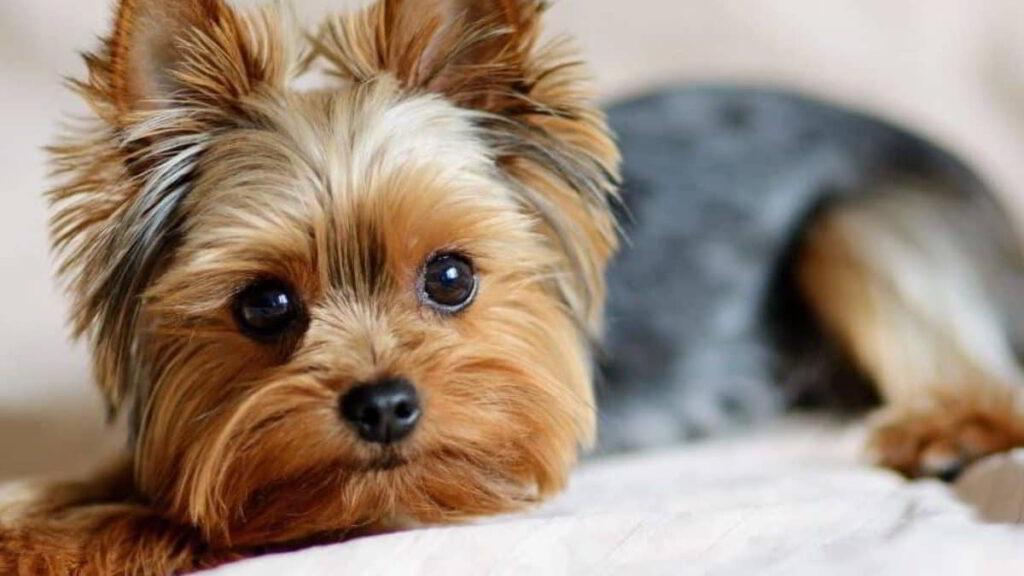Characteristics, History, Care Tips, and Helpful Information for Pet Owners
Yorkshire Terriers, commonly called Yorkies, are little dogs with tenacious personalities. They’re one of the most popular dog breeds worldwide. Though technically categorized in the toy group, they take on many terrier traits as well.
Yorkies tend to be very vocal, protective, and loyal. Despite their small size, they make excellent guard dogs. At heart, Yorkies are wonderful companions that love to be pampered and snuggle up to their loved ones.

| Breed Overview GROUP: Toy HEIGHT: 8 To 9 Inches WEIGHT: 5 To 7 Pounds COAT AND COLOR: Standard Color Combinations Are Black And Gold, Black And Tan, Blue And Gold, And Blue And Tan. Puppies May Not Display Their Final Coat Color Until Age 3 Or Older. Yorkshire Terriers Have A Long, Straight, And Silky Coat. LIFE EXPECTANCY: 13 To 16 Years |
Characteristics of the Yorkshire Terrier
| Amount Of Shedding | Low |
| Tendency To Bark | Medium |
| Intelligence | Medium |
| Trainability | Medium |
| Energy Level | High |
| Playfulness | High |
| Exercise Needs | High |
| Pet-Friendly | Medium |
| Kid-Friendly | Low |
| Friendliness | Medium |
| Affection Level | High |
History of the Yorkshire Terrier
Yorkshire terriers can be traced back to the migration of weavers from Scotland to Yorkshire, England, in the mid-19th century. They were developed through breeding the Waterside terrier with various other terriers. While used as working dogs by weavers to control rodents, they became quite fashionable during Victorian times.
A Yorkie will not do well in a household where it’s left alone most of the day. The American Kennel Club (AKC) first recorded a Yorkie in 1885.
A noble Yorkie named Smoky was found by an American soldier in the jungles of Papua New Guinea in World War II. She provided a heroic service by dragging communications cable through a 60-foot long culvert that was only 8 inches wide. She later worked as a therapy dog for wounded soldiers and has several memorials dedicated to her. Her owner, Corporal William A. Wynne, recalls Smoky’s story in the book, Yorkie Doodle Dandy.
Yorkshire Terrier Care
Yorkies are more than just lapdogs. This breed can actually be quite vocal and stubborn at times. Early training and socialization with people and other dogs are very important for the Yorkie and will help keep that “big personality” from getting out of control. A well-trained Yorkie is much more attentive to its owner. Proper training also makes it easier to handle your Yorkie at places like the veterinarian.
It’s often noted that a Yorkshire terrier is unlikely to do well in a household with small children. The problems come both with children’s rough handling and by the dog’s reaction to nip when provoked. Yorkies may also get into displays of dominance around other dogs and are fearless when challenging larger dogs, which can sometimes put them in danger. The trendiness of this breed is still notable today, as Yorkies have become probably the most popular breeds since coming to the United States in the 1870s. This breed needs lots of attention and does best when kept near a human companion. Otherwise, it may display separation anxiety and develop bad habits.
Yorkies are well suited to apartment living due to their small size. However, they’re not couch potatoes. Yorkies are active dogs that still need regular exercise. Daily walks should keep the average Yorkie happy and healthy, though many Yorkies need to run and play in addition to strolling with their owners. Be sure to monitor your dog’s behavior on or off leash as Yorkies like to chase things and pick fights with dogs large and small.
Yorkies are not well-suited to extreme temperatures, hot or cold, so they do best in temperate climates and indoors.

Free-feeding or giving your dog bites from your plate isn’t recommended or you could end up with an overweight dog.
Yorkies have silky, continuously growing hair which should be brushed regularly if kept long. Many Yorkie owners choose to keep their hair cut short (usually by a groomer every several weeks). Either way, Yorkies require a moderate amount of routine grooming. If left untrimmed, a Yorkie may have so much long hair on its face that it needs a hairband to keep it out of the way while eating.
Because they don’t shed as much as some other breeds, Yorkies are often called hypoallergenic. However, what triggers allergies is the dog’s dander or saliva, and a Yorkie may still provoke an allergic reaction in those who are sensitive.
Yorkshire terriers are known to be difficult to housebreak, so expect a bit of a struggle until you have success. Keep plenty of puppy pads handy during this long process. Your dog may refuse to go outside in the rain and you may need a covered area for potty breaks.
Common Health Problems
Responsible breeders strive to maintain the highest breed standards as established by kennel clubs just like the AKC. Dogs bred by these standards are less likely to develop hereditary conditions. However, some hereditary health problems can occur in the breed. The following are usually some conditions to be aware of:
Patellar luxation: This is looseness of the kneecap that can result in dislocation. While the knee will often pop back withinto place, surgery may be required in severe conditions.
Collapsing trachea: Yorkies are prone to this condition that may get worse with age. The dog may display a chronic cough.
Portosystemic shunts (PSS): This is a defect in the blood flow between the liver and the body. It is usually detected before 2 years of age and may be managed by surgery and diet.
Intervertebral disc disease: Herniated discs in the back can be the result of a predisposition or injury.
Diet and Nutrition
Feed your Yorkshire terrier twice a day for a total of about 1/2 cup of dry dog food. Be consistent in refusing to share your food with your dog. This breed is known to experience digestive upsets such as vomiting and diarrhea when they have such treats. Take your Yorkie for a walk in the coolest part of the day in hot weather and provide a sweater during cold weather. This predisposes the dog to a shorter lifespan and other health conditions. Discuss any weight gain together with your veterinarian to get recommendations for a feeding schedule, specialty dog food, and exercise needs.
Pros
- Good watch dog
- Affectionate and loyal
- Energetic and entertaining
Cons
- Temperamental with other dogs and children
- Difficult to housebreak
- Can be loud

Where to Adopt or Buy a Yorkshire Terrier
If you think you’d like to adopt a Yorkshire terrier, start by contacting one of the following reputable associations:
- The Yorkshire Terrier Club of America
- Save a Yorkie Rescue
- United Yorkie Rescue
These organizations will be able to provide guidance and options for adoption. If you aren’t certain the breed is right for you, try fostering to test if a Yorkie can be a good fit for your home.
More Dog Breeds and Further Research
As with any breed, if you think the Yorkshire terrier is right for you, be sure to do plenty of research before obtaining one. Talk to other Yorkshire terrier owners, reputable breeders, and rescue groups to find out more.
You may want to learn more about these similar dog breeds:
- Silky Terrier
- Papillon
- Bichon Frise
- Dandie Dinmont Terrier
You can also explore many other dog breeds to find the right one.
